The global metal casting market is likely to reach from USD 159.9 billion in 2025 to approximately USD 255.6 billion by 2035, recording an absolute increase of USD 95.6 billion over the forecast period. This translates into a total growth of 59.8%, with the market forecast to expand at a compound annual growth rate (CAGR) of 4.8% between 2025 and 2035. The market size is expected to grow by nearly 1.6X during the same period, supported by the rising demand for lightweight automotive components and increasing infrastructure development activities across emerging economies worldwide.
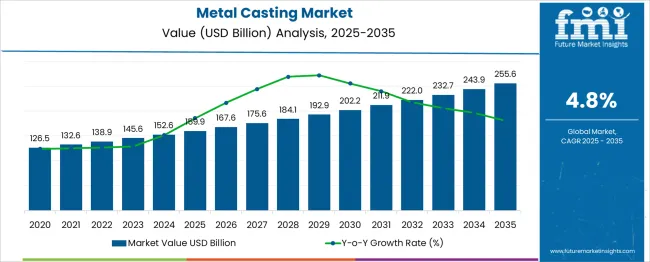
Between 2025 and 2030, the metal casting market is projected to expand from USD 159.9 billion to USD 200.94 billion, resulting in a value increase of USD 41.02 billion, which represents 42.9% of the total forecast growth for the decade. This phase of growth will be shaped by rising automotive production volumes, increasing adoption of lightweight metal components, and growing infrastructure development projects across emerging economies. Manufacturers are expanding their production capabilities to address the growing complexity of precision casting requirements across automotive and industrial applications.
From 2030 to 2035, the market is forecast to grow from USD 200.94 billion to USD 255.6 billion, adding another USD 54.63 billion, which constitutes 57.1% of the ten-year expansion. This period is expected to be characterized by widespread deployment of advanced casting technologies, integration of automation and digitalization in foundry operations, and development of green casting processes with reduced environmental impact. The growing emphasis on electric vehicle production and renewable energy infrastructure will drive demand for more sophisticated casting solutions with enhanced material properties and precision tolerances.
| Metric | Value |
| Estimated Value in (2025E) | USD 159.9 billion |
| Forecast Value in (2035F) | USD 255.6 Billion |
| Forecast CAGR (2025 to 2035) | 4.8% |
Market expansion is being supported by the rapid increase in automotive production worldwide and the corresponding need for lightweight, durable metal components that can improve fuel efficiency and vehicle performance. Modern automotive manufacturing relies on advanced casting technologies to produce complex engine components, transmission parts, and structural elements that meet stringent quality and performance standards. The growing complexity of automotive systems and increasing emphasis on emission reduction are driving demand for precision casting solutions from certified foundries with appropriate quality certifications and technical capabilities.
The expanding infrastructure development activities and rising construction projects are creating significant demand for cast metal components used in building systems, industrial equipment, and transportation infrastructure. Government initiatives promoting industrial development and renewable energy projects are establishing new requirements for high-performance cast components that require advanced materials and specialized manufacturing processes.
The market is segmented by material outlook, application, and region. By material outlook, the market is divided into aluminum, iron, steel, and others. Based on application, the market is categorized into automotive, industrial, building & construction, and others. Regionally, the market is divided into North America, Europe, East Asia, South Asia & Pacific, Latin America, and Middle East & Africa.
Aluminum is projected to account for 40% of the metal casting market in 2025. This leading share is supported by the superior properties of aluminum including lightweight characteristics, corrosion resistance, and excellent thermal conductivity that make it ideal for automotive and aerospace applications. Aluminum casting provides cost-effective manufacturing solutions for complex geometries while offering recycling advantages and environmental benefits. The segment benefits from continuous alloy development and advanced casting process optimization.
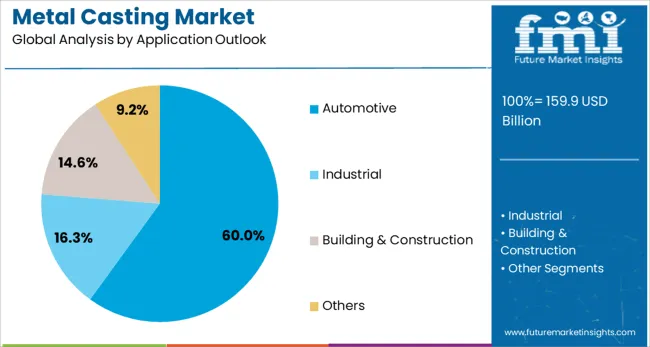
Automotive applications are expected to represent 60% of the application segment in 2025. This dominant share reflects the critical importance of cast metal components in automotive manufacturing including engine blocks, transmission housings, suspension components, and body structural parts. Automotive casting requirements demand high precision, dimensional accuracy, and consistent material properties to meet safety and performance standards. The segment benefits from increasing vehicle production and growing adoption of lightweight materials for fuel efficiency improvement.
The metal casting market is advancing steadily due to increasing automotive production and growing infrastructure development requirements across emerging economies. However, the market faces challenges including environmental regulations affecting foundry operations, energy cost pressures, and increasing competition from alternative manufacturing technologies. Technology advancement and ecofriendly initiatives continue to influence market development and operational practices.
The growing deployment of aluminum and magnesium alloys in automotive and aerospace applications is enabling significant weight reduction while maintaining structural integrity and performance characteristics. Advanced alloy development provides enhanced material properties including improved strength-to-weight ratios, corrosion resistance, and thermal management capabilities. These advanced materials are particularly valuable for electric vehicle applications where weight reduction directly impacts battery performance and driving range.
Modern foundries are incorporating automated casting systems, robotic handling equipment, and digital process monitoring that improve production efficiency, quality consistency, and operational safety. Integration of Internet of Things sensors and data analytics enables predictive maintenance, process optimization, and comprehensive quality control throughout casting operations. Advanced manufacturing technologies also support customization capabilities and rapid prototyping for new product development.
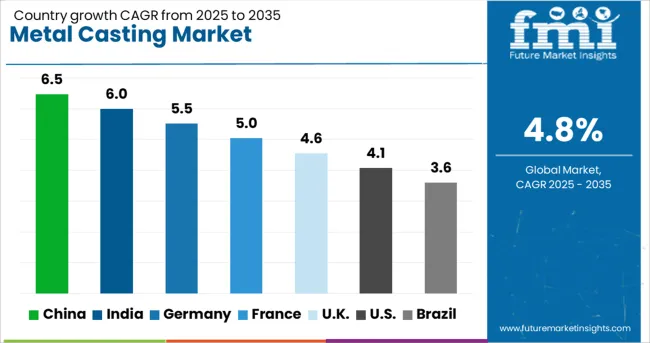
| Country | CAGR (2025-2035) |
| China | 6.5% |
| India | 6.0% |
| Germany | 5.5% |
| France | 5.0% |
| United Kingdom | 4.6% |
| United States | 4.1% |
| Brazil | 3.6% |
The metal casting market demonstrates solid growth across major economies, with China leading at a 6.5% CAGR through 2035, driven by massive automotive production and infrastructure development activities. India follows at 6.0%, supported by growing manufacturing sector and increasing automotive assembly operations. Germany records 5.5% growth, emphasizing automotive industry innovation and precision casting technologies. France shows 5.0% expansion, driven by aerospace applications and automotive component manufacturing. The United Kingdom demonstrates 4.6% growth, focusing on high-value applications and advanced materials. The United States records 4.1% growth, supported by established manufacturing infrastructure, while Brazil grows at 3.6% with developing industrial capabilities.
The report covers an in-depth analysis of 40+ countries; seven top-performing countries are highlighted below.
The metal casting market in China is projected to exhibit the highest growth rate with a CAGR of 6.5% through 2035, driven by massive automotive production volumes and comprehensive infrastructure development projects across major industrial regions. The country's expanding manufacturing sector and increasing domestic demand for cast metal components are creating significant opportunities for foundry operations and casting technology advancement. Major automotive manufacturers and industrial equipment producers are establishing comprehensive casting capabilities to support the growing requirements of domestic and export markets.
Government industrial development policies are mandating advancement of manufacturing capabilities and establishing supportive frameworks for foundry modernization, driving investment in advanced casting technologies throughout major industrial centers. Infrastructure development programs are supporting deployment of modern foundry equipment and comprehensive training programs that enhance production capabilities across regional manufacturing networks.
The metal casting market in India is expanding at a CAGR of 6.0%, supported by rapidly growing manufacturing sector and increasing automotive assembly operations across the country. India's expanding industrial infrastructure and rising domestic demand for manufactured goods are driving investment in foundry capabilities and casting technology advancement. Manufacturing companies and automotive suppliers are gradually establishing advanced casting operations to serve the growing requirements of domestic production and export markets.
Manufacturing sector development and automotive industry expansion initiatives are creating opportunities for casting solution providers that can deliver cost-effective technologies and comprehensive technical support services. Professional manufacturing development and technical training programs are building expertise among foundry operators, enabling casting technology deployment that meets international quality standards and automotive industry requirements.
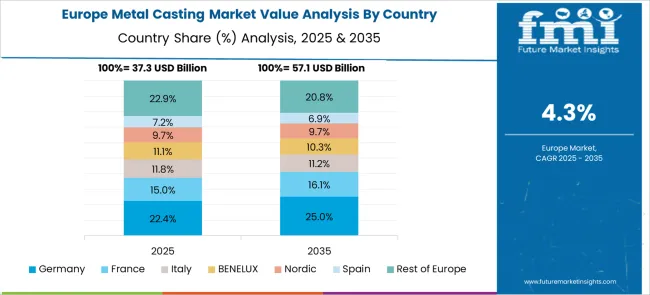
Demand for metal casting in Germany is projected to grow at a CAGR of 5.5%, supported by the country's leadership in automotive industry innovation and comprehensive precision casting technology capabilities. German automotive manufacturers are implementing advanced casting processes that meet stringent quality standards and performance requirements for premium vehicle applications. The market is characterized by focus on precision engineering, advanced materials development, and compliance with comprehensive environmental regulations.
Automotive industry investments are prioritizing casting technologies that demonstrate superior quality and innovation capabilities while meeting German automotive standards and environmental compliance requirements. Professional engineering certification programs are ensuring comprehensive technical expertise among foundry operators, enabling specialized casting applications that support diverse automotive components and export requirements.
Demand for metal casting in France is expanding at a CAGR of 5.0%, driven by aerospace industry requirements and comprehensive automotive component manufacturing capabilities. French aerospace and automotive manufacturers are incorporating advanced casting technologies that support high-performance applications and stringent quality requirements. The market benefits from established engineering expertise and comprehensive government support for advanced manufacturing technology development.
Aerospace industry development programs are facilitating adoption of specialized casting processes that provide enhanced material properties and precision manufacturing capabilities while supporting French technology independence objectives. Professional manufacturing development initiatives are ensuring comprehensive capabilities among foundry professionals, enabling specialized casting technology deployment that meets evolving aerospace and automotive requirements.
The metal casting market in the United Kingdom is projected to grow at a CAGR of 4.6%, supported by attention on high-value casting applications and advanced materials development across automotive and aerospace sectors. British manufacturing companies are implementing casting technologies that provide enhanced performance characteristics and specialized material properties. The market is characterized by focus on innovation, advanced alloy development, and comprehensive quality management systems.
Manufacturing sector investments are enabling deployment of casting technologies that demonstrate superior performance and innovation capabilities while maintaining cost-effectiveness and environmental compliance standards. Professional manufacturing development programs are ensuring specialized expertise among foundry operators, enabling comprehensive casting capabilities supporting evolving industrial requirements and export market demands.
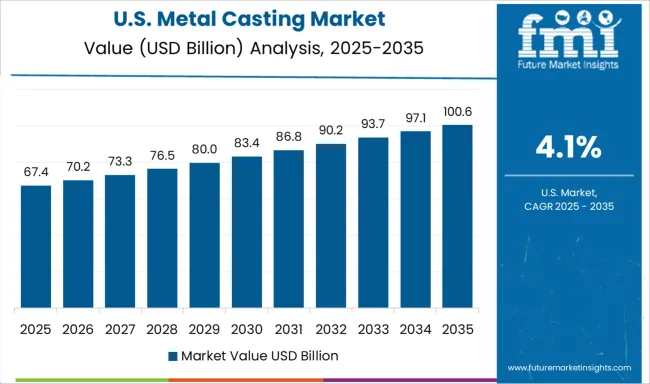
The metal casting market in the United States is expanding at a CAGR of 4.1%, driven by established manufacturing infrastructure and continued innovation in casting technology applications. American foundries are maintaining comprehensive casting capabilities through adoption of advanced processes and automated manufacturing systems. The market benefits from substantial private sector investment and established automotive industry presence.
Manufacturing technology investments are enabling continued advancement of casting capabilities through integration of innovative processes and comprehensive quality management systems. Professional development programs are maintaining technical expertise among foundry professionals, enabling comprehensive casting capabilities that support diverse automotive, aerospace, and industrial application requirements.
The demand of metal casting in Brazil is growing at a CAGR of 3.6%, driven by developing industrial capabilities and increasing automotive assembly operations across major manufacturing regions. Brazilian foundries and manufacturing companies are investing in casting technologies that can support growing domestic demand and export opportunities. Industrial suppliers and automotive manufacturers are establishing casting capabilities to serve evolving market requirements.
Industrial development programs are facilitating adoption of casting technologies that support comprehensive manufacturing applications across diverse industrial sectors and automotive assembly operations. Professional capability development initiatives are enhancing technical expertise among foundry operators, enabling casting technology deployment that meets evolving industrial requirements and international quality standards.
The metal casting market in Europe is projected to grow steadily across major countries, with Germany leading the regional market development. The United Kingdom maintains strong demand for cast metal components, supported by automotive manufacturing and industrial applications. France demonstrates consistent investment in foundry technologies, driven by aerospace industry requirements and automotive component production.
Germany is expected to maintain its leadership position in European metal casting, supported by its advanced automotive industry and comprehensive manufacturing infrastructure. The country benefits from established foundry expertise and supportive regulatory environment for manufacturing technology advancement.
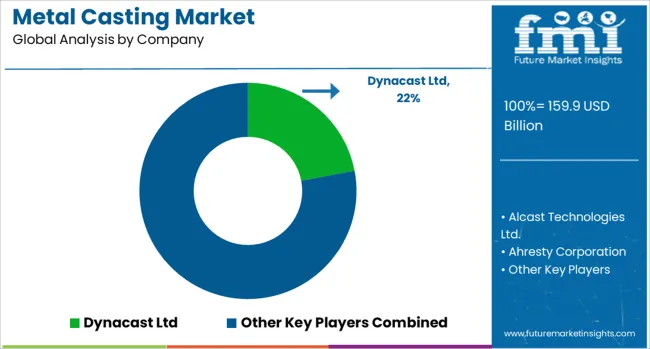
The metal casting market is defined by competition among foundry operators, metal processing companies, and specialized casting solution providers. Companies are investing in advanced casting technologies, automated production systems, comprehensive quality management, and technical expertise to deliver high-quality, cost-effective, and innovative metal components. Strategic partnerships, technology advancement, and market expansion strategies are central to strengthening production capabilities and customer relationships.
Dynacast Ltd., global operations, offers comprehensive precision casting solutions with focus on complex geometries and high-volume production applications. Alcast Technologies Ltd., provides specialized aluminum casting services with emphasis on automotive and industrial components. Ahresty Corporation, Japan, delivers advanced die casting technologies with focus on automotive applications and precision manufacturing. Calmet, United States, focuses investment casting solutions and specialized alloy applications. Endurance Technologies Limited, India, focuses on automotive casting components and integrated manufacturing solutions. GF Casting Solutions Switzerland, provides comprehensive casting systems and foundry technologies. Metrics Holdings, United States, Proterial Ltd., Japan, Rheinmetall AG, Germany, and Ryobi Limited, Japan, offer specialized casting expertise, advanced manufacturing capabilities, and comprehensive metal component solutions across global automotive, industrial, and construction markets.
| Item | Value |
| Quantitative Units | USD 159.9 billion |
| Material | Aluminum, iron, steel, others |
| Application | Automotive, industrial, building & construction, others |
| Regions Covered | North America, Europe, East Asia, South Asia & Pacific, Latin America, Middle East & Africa |
| Country Covered | United States, Canada, United Kingdom, Germany, France, China, Japan, South Korea, India, Brazil, Australia and 40+ countries |
| Key Companies Profiled | Dynacast Ltd., Alcast Technologies Ltd., Ahresty Corporation, Calmet, Endurance Technologies Limited, GF Casting Solutions, Metrics Holdings, Proterial, Ltd., Rheinmetall, Ryobi Limited. |
| Additional Attributes | Dollar sales by material and application, regional demand trends across North America, Europe, and Asia-Pacific, competitive landscape with established foundry operators and specialized casting companies, development capabilities for different materials and manufacturing processes, integration with advanced automation and digitalization technologies, innovations in lightweight materials and sustainable casting processes, and adoption of precision manufacturing systems with enhanced quality control and comprehensive environmental compliance for optimized production efficiency and component performance. |
The global metal casting market is estimated to be valued at USD 159.9 billion in 2025.
The market size for the metal casting market is projected to reach USD 255.6 billion by 2035.
The metal casting market is expected to grow at a 4.8% CAGR between 2025 and 2035.
The key product types in metal casting market are aluminum, iron, steel and others.
In terms of application outlook , automotive segment to command 60.0% share in the metal casting market in 2025.






Our Research Products

The "Full Research Suite" delivers actionable market intel, deep dives on markets or technologies, so clients act faster, cut risk, and unlock growth.

The Leaderboard benchmarks and ranks top vendors, classifying them as Established Leaders, Leading Challengers, or Disruptors & Challengers.

Locates where complements amplify value and substitutes erode it, forecasting net impact by horizon

We deliver granular, decision-grade intel: market sizing, 5-year forecasts, pricing, adoption, usage, revenue, and operational KPIs—plus competitor tracking, regulation, and value chains—across 60 countries broadly.

Spot the shifts before they hit your P&L. We track inflection points, adoption curves, pricing moves, and ecosystem plays to show where demand is heading, why it is changing, and what to do next across high-growth markets and disruptive tech

Real-time reads of user behavior. We track shifting priorities, perceptions of today’s and next-gen services, and provider experience, then pace how fast tech moves from trial to adoption, blending buyer, consumer, and channel inputs with social signals (#WhySwitch, #UX).

Partner with our analyst team to build a custom report designed around your business priorities. From analysing market trends to assessing competitors or crafting bespoke datasets, we tailor insights to your needs.
Supplier Intelligence
Discovery & Profiling
Capacity & Footprint
Performance & Risk
Compliance & Governance
Commercial Readiness
Who Supplies Whom
Scorecards & Shortlists
Playbooks & Docs
Category Intelligence
Definition & Scope
Demand & Use Cases
Cost Drivers
Market Structure
Supply Chain Map
Trade & Policy
Operating Norms
Deliverables
Buyer Intelligence
Account Basics
Spend & Scope
Procurement Model
Vendor Requirements
Terms & Policies
Entry Strategy
Pain Points & Triggers
Outputs
Pricing Analysis
Benchmarks
Trends
Should-Cost
Indexation
Landed Cost
Commercial Terms
Deliverables
Brand Analysis
Positioning & Value Prop
Share & Presence
Customer Evidence
Go-to-Market
Digital & Reputation
Compliance & Trust
KPIs & Gaps
Outputs
Full Research Suite comprises of:
Market outlook & trends analysis
Interviews & case studies
Strategic recommendations
Vendor profiles & capabilities analysis
5-year forecasts
8 regions and 60+ country-level data splits
Market segment data splits
12 months of continuous data updates
DELIVERED AS:
PDF EXCEL ONLINE
Metal Stampings, Forgings, and Castings Market Growth – Trends & Forecast 2025 to 2035
Metallurgical Lighting Market Size and Share Forecast Outlook 2025 to 2035
Metal Evaporation Boat Market Size and Share Forecast Outlook 2025 to 2035
Metal Miniature Bone Plates Market Size and Share Forecast Outlook 2025 to 2035
Metal Locking Plate and Screw System Market Size and Share Forecast Outlook 2025 to 2035
Metal Pallet Market Size and Share Forecast Outlook 2025 to 2035
Metal Oxide Varistor (MOV) Surge Arresters Market Size and Share Forecast Outlook 2025 to 2035
Metal Straw Market Size and Share Forecast Outlook 2025 to 2035
Metal Can Market Size and Share Forecast Outlook 2025 to 2035
Metal IBC Market Forecast and Outlook 2025 to 2035
Metalized Barrier Film Market Forecast and Outlook 2025 to 2035
Metal Packaging Market Size and Share Forecast Outlook 2025 to 2035
Metal Bellow Market Size and Share Forecast Outlook 2025 to 2035
Metal based Safety Gratings Market Size and Share Forecast Outlook 2025 to 2035
Metal Modifiers Market Size and Share Forecast Outlook 2025 to 2035
Metallic Stearate Market Size and Share Forecast Outlook 2025 to 2035
Metallic Labels Market Size and Share Forecast Outlook 2025 to 2035
Metal Recycling Market Size and Share Forecast Outlook 2025 to 2035
Metal Forming Fluids Market Size and Share Forecast Outlook 2025 to 2035
Metal Removal Fluids Market Size and Share Forecast Outlook 2025 to 2035

Thank you!
You will receive an email from our Business Development Manager. Please be sure to check your SPAM/JUNK folder too.
Chat With
MaRIA